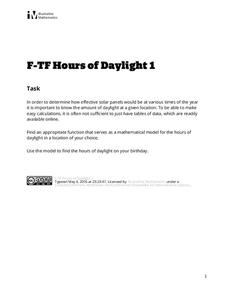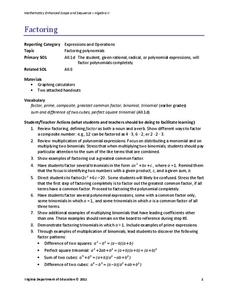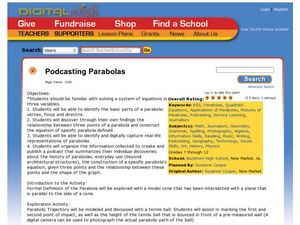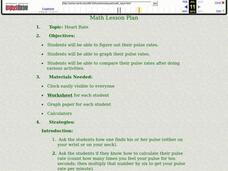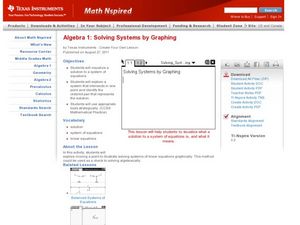Curated OER
How Fast is it Traveling?
Young scholars calculate the rate of speed of various moving objects within the classroom setting, or outside under a controlled environment.
Curated OER
Algebra 1: Slope as Rate
Students solve problems with slopes. In this algebra lesson, students identify the slope of a line and relate it to the rate of change. They graph their lines on the TI and observe changes in the lines.
EduGAINs
Solving Linear Equations
To find x, you have to get it by itself, correct? Individuals solve a linear word problem and share their solutions with others that solved the problem in a similar fashion. They then complete a self-assessment on how they feel about...
Teach Engineering
Edible Rovers (High School)
Design and build a rover ... then eat it? This activity has groups of two design and build Mars rovers. The teams determine what instruments they want to include with their rover and plan a budget. They calculate the cost of the body of...
Illustrative Mathematics
Hours of Daylight 1
The midline of the mathematical model of the number of hours of sunlight is not 12 hours. Pupils use the modeling cycle to determine a function that will model the number of hours of sunlight at a location of their choosing. Using...
Virginia Department of Education
Factoring
Uncover the relationship between factoring quadratics and higher degree polynomials. Learners develop their factoring skills through repetition. A comprehensive activity begins with quadratics and shows how to use the same patterns to...
EngageNY
Understanding Box Plots
Scholars apply the concepts of box plots and dot plots to summarize and describe data distributions. They use the data displays to compare sets of data and determine numerical summaries.
Curated OER
Podcasting Parabolas
Students explore parabolas. In this algebra and technology instructional activity, students construct the equation of a specific parabola, then take digital photos of real-life representations of these parabolas. Students...
EngageNY
Making Fair Decisions
Life's not fair, but decisions can be. The 17th installment of a 21-part module teaches learners about fair decisions. They use simulations to develop strategies to make fair decisions.
Virginia Department of Education
Radioactive Decay and Half-Life
Explain the importance of radioactive half-life as your high school biologists demonstrate the concept by performing a series of steps designed to simulate radioactive decay. Pupils use pennies to perform an experiment and gather data....
Utah Education Network (UEN)
The Pasture and the Fence
Beginning geometers use tiles and grid paper to draw and calculate perimeter and area. Rectangles of different sizes are created and then measured to build understanding. The one-inch grid sheet referenced is attached.
Curated OER
Range, Cluster, Gap and Outliers
There are a number of activities here where learners collect and record data, as well as, activities where the likelihood of an event happening is calculated given the experimental probability. Young statisticians organize information...
Curated OER
Influence and Outliers
Using the TI-Nspire calculator, statisicians identify outliers and their effect on the least-squares regression line. In finding the line of best fit, they determine what points will affect the least squares regressions and what points...
Teach Engineering
Understanding the Air through Data Analysis
Is there a correlation or causation relationship between air pollutants? Groups develop a hypothesis about the daily variation of air pollutants, specifically ozone and CO2. Using Excel to analyze the data, the groups evaluate their...
Education Development Center
Distance, Rate, and Time—Walking Home
Dig into a classic math problem with your classes. Through an engaging task, learners work with rate and distance information to make conclusions. In the task, two people walk at different rates; one leaves first, and scholars...
Chemistry Collective
Virtual Lab: Weak Acid and Base Problems
You'll feel strongly about this weak acid and base virtual lab! Scholars experiment with the wonders of dissociation constants in a simulated lab environment. The accompanying written work includes buffer preparation, titration curves,...
Curated OER
Graph Transforms
In this graph transforms worksheet, 10th graders solve and complete 15 various types of problems. First, they evaluate each function and sketch the graph. Then, 10th graders determine why two transformation illustrated are identical for...
Curated OER
Trigonometric Graphs
In this Trig worksheet, 12th graders identify and differentiate between trig graphs. They identify phase, translation and solve equations dealing with angles.
Curated OER
Graphing Heart Rates
Students take their pulse rates. In this graphing lesson, students take their pulse rates and graph them. Students do various physical activities and graph the differences in their pulse rates.
Curated OER
Density Graph Questions
For this density worksheet, learners use the mass of aluminum and copper at different volumes to create a graph in order to calculate the density of these metals. This worksheet has 1 graph, 2 short answer, and 5 word problems.
Curated OER
More Density Graph Questions
In this density graph learning exercise, students graph data displayed in a chart. Students also calculate the density of each metal shown in the graph. Students answer questions about which detail is more dense.
Curated OER
Graphing Functions
In this graphing functions worksheet, students solve and complete 13 different problems that include identifying and graphing various functions. First, they graph each of the functions shown on the graphs provided. Then, students solve...
Curated OER
Using a Spreadsheet to Understand Density
Students use density to identify what metal a gold colored weight is made of. They use a spreadsheet to graph the experimental density of common metals and compare the know densities to their calculated density of the known metal.
Curated OER
Solving Systems by Graphing
Solve systems of equations with your super smart upper graders. They solve systems of equations and then graph two lines to find where they intersect. The focus on the activity is to have learners explore moving a point to...






